A jar of spicebush tea sits on a picnic table, surrounded by edible-plant reference books. The tea, made with twigs cut from a bush on the grounds of Warren Wilson College Farm and sweetened with honey, darkens and ripens in the sun. About 50 yards away, a pig roots noisily and happily, digging crabgrass out of a muddy field while searching for tastier things among the roots. They’re “piggerating” the plot, Patrick Ross, Warren Wilson’s garden manager, explained later. These pigs are not for dinner, apparently.
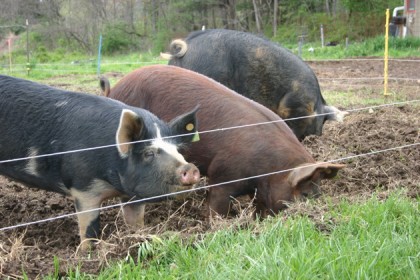
The cold-weather greens — the spinach and kale — are in full effect, jump-started by the unseasonably warm spring. In the sunnier patches of the field at Warren Wilson College Farm, the chickweed has already gone to seed, almost past its prime in mid-March.
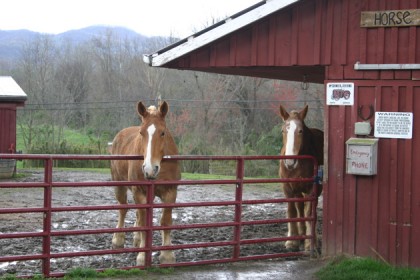
Warren Wilson mascots
Though the fields and greenhouses of the farm brim with cultivated food — baby lettuces, over-wintered squash — we’re foraging in the forest, field and creek-side for what some consider weeds (and by the end of the day, that notion will seem foolish).
Katie Button, chef of Cúrate, invited Gunnar Karl Gíslason to fly all the way from his restaurant Dill, located in Iceland, to help prepare a dinner of foraged edibles in Asheville. In Reykjavik, Gíslason upholds the tenets of new Nordic cuisine, which are rooted in tradition. He gathers and dries seaweed, picks pine, wild chervil and sea buckthorn, pairing it with proteins like Arctic char, Icelandic lamb and (occasionally) reindeer. He hay-smokes various items, salts his cod and distills liquors from birch.
Here in Asheville, Gíslason is gingerly stripping young blossoms from a lithe redbud tree, bright against a gray sky. The young flowers taste a bit like light and floral pea shoots — in other words, like spring. Later that evening, the flowers will garnish an outstanding dessert that the Icelandic chef and Button will serve to a crowd gathered in the cafeteria area of the school, capping off a four-course dinner.
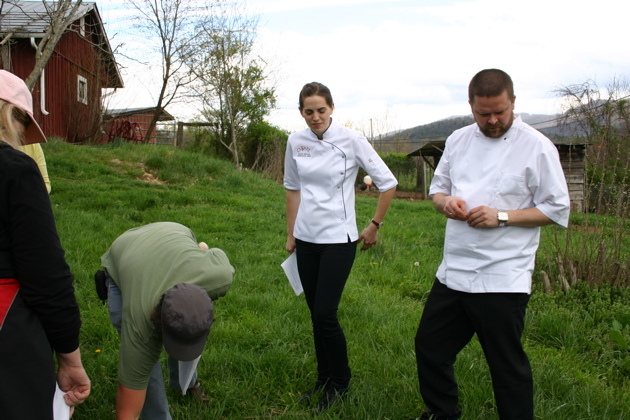
Gislason and Button
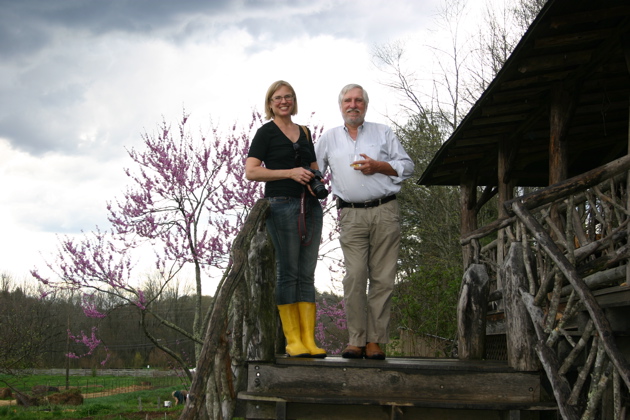
Bob Bowles and Susi Seguret
Pre-dinner, we’re touring the Warren Wilson property. Even before the hors d’oeuvres, we’re finding plenty to nibble on around the perimeter of the agricultural fields. We sample wood sorrel, tart with oxalic acid. Consuming too much can cause “problems,” says Warren Wilson sustainable agriculture and ethnobotany teacher Jay Bost. Oxalic acid is one of the offending chemicals in rhubarb leaves, someone else mentions. We don’t eat too much.
Bost points out that, although Japanese honeysuckle is invasive, it is edible and has antibiotic properties, too. It’s at least respected for its ornamental properties, unlike the wild garlic that Bost plucks from the soil and holds up for the group to see. “It’s a yard weed, but here it is — and we’re going to use it,” he says.
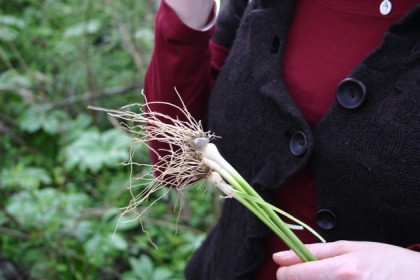
We duck onto a creek-side path, lined with various types of wild mustard, including one plant that has tiny broccoli-like florets and tastes vaguely like green garlic. There are stinging nettles and the less aggressive wood nettle. The wild greens and herbs are everywhere, and suddenly, the landscape is edible. The awakening to the abundance around us is eye-opening.
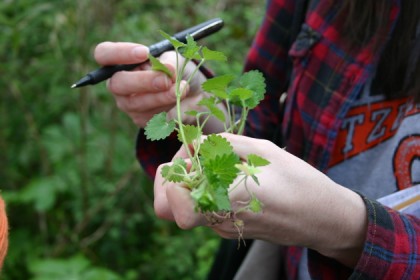
“About 20,000 out of 250,000 plants are usable,” says Bost. “But about 85 percent of our calories come from three plants, and the rest from about 120.”
After we’ve explored the greenhouses, herb cabin and metal-smithing workshop while hiding from a sudden cloudburst of hail, we have the opportunity to change out of our sodden field clothes and into something more dinner-appropriate, meeting by the Warren Wilson cafeteria for champagne-like birch cocktails and hors d’oeuvres with Nordic-inspired ingredients like beets, dill and shaved, dried fish.
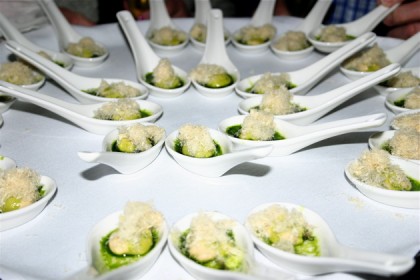
The day has turned cold since the early spring storm passed through. The seemingly soft-spoken Gíslason addresses the crowd, praising the farm, WNC and its edible bounty. “I would like to have my restaurant here, actually,” he quips. We rather seriously encourage this idea.
“I hope you’ve enjoyed everything so far,” he says with a wink. “It’s all downhill from here.”
Gíslason fills a large stock pot with barnyard-scented hay, then lights it on fire. He’ll smoke dill to make a sauce for one of the courses we’re about to take in.
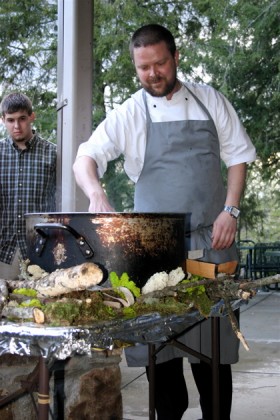
The smoke obscures the faint wet-earth smell that’s settled in with the evening on the campus grounds. The hay smoke lingers lightly on our clothes when we head inside.
That smoked dill will make a translucently emerald-green sauce that will serve to lend an earthiness and depth of flavor to a dish of halibut and fennel salad with micro-radishes.
But the starter, simple as it was, may have upstaged that dish. Sweet rye bread “ash” from Farm & Sparrow bread was almost revelatory when paired with goat cheese, shaved celery root and chickweed salad. The bread product was more crumb than ash, toasted — nearly blackened — but retaining some sweetness, roasted to almost coffee-like flavor.
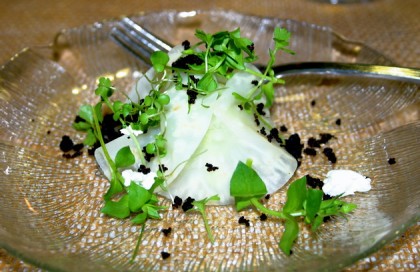
Icelandic lamb was served two ways — braised shoulder and a generous slice of loin — with a sauce made with that local wild green garlic and wedges of almost-too-crisp rutabega, dusted with seaweed, likely dulse, foraged from Icelandic shores.
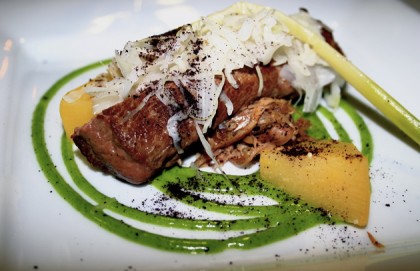
But really, nothing could possibly upstage that dessert, a base of pine-oil cake with an apple sorbet, skyr, ribbons of celery, frozen beads of green apple, pistachio and redbud blossoms. All spring and light, the clean and palate-refreshing dessert easily gives chocolate a run for its money.
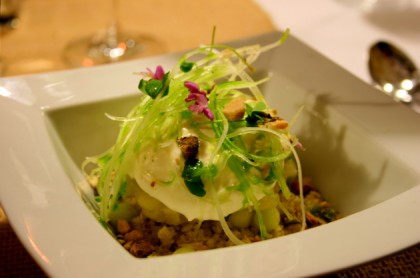
After dinner, we lingered over local beer — made especially for the evening by Farmhouse brewery — then headed off into the night with a blush from birch moonshine that we tried to pass off as sunburn.




Before you comment
The comments section is here to provide a platform for civil dialogue on the issues we face together as a local community. Xpress is committed to offering this platform for all voices, but when the tone of the discussion gets nasty or strays off topic, we believe many people choose not to participate. Xpress editors are determined to moderate comments to ensure a constructive interchange is maintained. All comments judged not to be in keeping with the spirit of civil discourse will be removed and repeat violators will be banned. See here for our terms of service. Thank you for being part of this effort to promote respectful discussion.